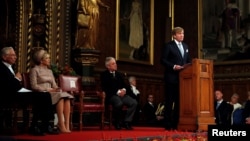King Willem-Alexander of the Netherlands highlighted the "shadow of uncertainty" hanging over Dutch nationals living in Britain due to Brexit in an address to the British parliament on Tuesday during a two-day state visit.
The king used a speech to lawmakers and diplomats in one of parliament's grandest halls to express his regret over Britain's decision to leave the European Union next year - a body he said was flawed, but which had also made great achievements.
"It truly saddens us to see a close partner leave. But of course we respect your country's choice," he said.
Reaching a deal and predicting the consequences of Brexit was a highly complex task, he said, adding that the 150,000 Dutch nationals living in Britain and 50,000 British nationals living in the Netherlands deserved special attention.
"Many of them have lived and worked here for many years. They feel at home in their local community and their contribution to society is valued," he said.
"Yet these individuals now live under the shadow of uncertainty about their future status. I understand how difficult this is for them and I trust this uncertainty will be resolved."
Earlier, the king and Queen Maxima were formally welcomed by Queen Elizabeth with a Guard of Honor before taking a state carriage procession along the Mall in London to lunch at Buckingham Palace.
The Dutch royals were also visiting the grave of William III and Mary II of England, the Anglo-Dutch couple who ruled Britain at the end of the 17th Century, and were also due to lay a wreath at the Grave of the Unknown Soldier in Westminster Abbey.
After his address to parliament the king was scheduled to take afternoon tea with Elizabeth's heir Charles at his official Clarence House residence.
Elizabeth was later hosting the Dutch royals at a banquet to celebrate the first UK state visit by Dutch monarchy for 36 years.
Queen Beatrix and Prince Claus visited Britain in 1982, while Elizabeth and her husband Prince Philip paid a state visit to Queen Juliana and Prince Bernhard of the Netherlands in 1958.





